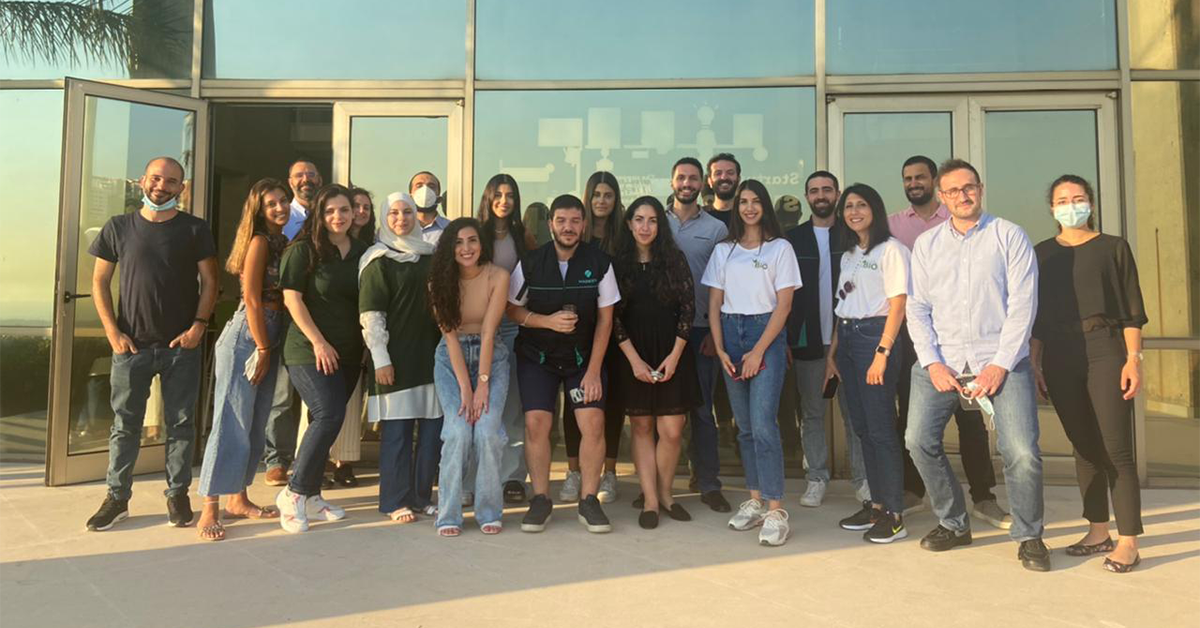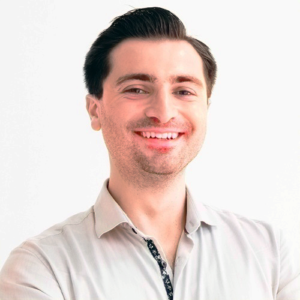It is custom that the startups that make it to the final phase of Berytech’s accelerator program showcase a year’s worth of work during the Demo day. This year the event of the first batch of the Cleanergy Accelerator program was done virtually organized within the Cleantech Innovation Day 2021.
Despite the current situation, the eight pitching startups have successfully completed the three-phase program, journeying through the accelerator to validate and grow their businesses. Their ideas spanned across the cleantech sector covering waste, wastewater and water management, transportation, energy, and agriculture.
During the first phase of the program, 23 startups were enrolled and went through a two-month support cycle during which the teams were introduced to market validation, team dynamics, and how to manage startups. Including one-on-one clinics with business advisors, field, and technical experts for each team. Upon ensuring the products are fit to market, the validation phase ended with an expert jury selecting the top 13 teams to go into the Acceleration Phase for 4 months.
During the second phase, the selected startups worked on validating their solution and building their minimum viable product (MVP). The teams had access to Berytech’s FabLab, early adopters, experts, and product developers who helped to test and refine their products while building their MVP. The teams were also able to establish their businesses from financial, marketing, management, and operational standpoints. At the end of the acceleration phase an expert jury selected the top eight startups to go into the Incubation Phase for 5 months.
In the final phase of the Cleantech Accelerator, the eight startups received support in scaling, fundraising, negotiation, intellectual property, legal, terms sheets, and market access. Additional support was given via MIT’s Confideo Venture Mentoring to nourish a creative “out of the box” thinking. The startups tested and validated their solutions by adopting the Living Lab approach.
Joelle Atallah one of the coaches to support the eight startups during the accelerator said “the teams have shown a remarkable level of drive and resilience all while successfully multitasking between product development, sales and business development, and all the operational aspects of building their ventures (hiring resources, identifying operational needs, etc.).” She further added that “by the end of the program, besides an increased level of business maturity and a mastery of business and finance concepts, most teams are now ready or in-the-process of reaching out to investors for their first funding rounds.”
Meet The Startups
BIOwayste
BIOwayste is a decentralized enclosed system that allows the on-site conversion of organic waste into biogas and biofertilizer through a simple and natural bio-degradation process.
The startup is aiming to become the next leader in the waste to energy technologies in the region. They already sold two units and are aiming to produce 15 more till the rest of the year.
Their plan is to increase production and sale, invest in Research and Development, and expand to the MENA region.
BIOwayste shared a few words on how the accelerator benefited their business: “We were able to get our Minimum Viable Product (MVP) ready and installed at two locations, at Le Caravelle and at the Business Incubation Association in Tripoli (BIAT), with two distinct designs. Additionally, the team is continuously collecting data to optimize and improve the product. We were able to hire one engineer in charge of all technical aspects of the production, and several potential projects are being discussed such as the chicken farm in Akkar to be valued between $150,000 to $200,000. Finally our business concept and approach is becoming more modular, which will enable us to cater for a wider range of clients and attracting several partnership opportunities in Lebanon and abroad.”
If you want to get in touch with the team, please click here.
DIWAMA
Over 85% of the waste is not being recovered and is ending up in landfills, and what is being recovered is decreasing in value by up to 50% due to contamination from wrong sorting.
The team of DIWAMA is answering this challenge by utilizing digital technologies to disrupt the waste management industry by developing a computer vision software for waste detection and analysis.
Their work has gained international interest and they are being supported by many international players. The startup is working to raise $415,000 for an 18-month runway to hire a team of engineers and sales.
DIWAMA shared a few words on how the accelerator benefited their business: “We were able to land a pilot with Veolia Middle East under their accelerator program “Spark”, another pilot with a global sorting systems supplier, and we were selected among the top 11 startups, out of one thousand startups, to join the Plug and Play accelerator in Paris in partnership with the Alliance To End Plastic Waste. Our Co-founder, Christopher Arida, was honored as One of the 2021 JCI Ten Outstanding Young Persons of the World, and we are currently working on improving our product, landing new pilots, and raising investments.”
If you want to get in touch with the team, please click here.
Garbaliser
At a time where Lebanon is importing more than 85% of its fertilizer, Garbaliser is a startup working on converting household food waste to natural fertilizer produced locally from 100% natural ingredients.
So far, they sold more than 5,000 liters of natural liquid fertilizers, by developing a production line that converts food leftovers and animal heads within 72 hours.
The team started during the Berytech e-hackathon – Cleanergy edition 2020 and were able to grow from a small idea to a growing factory within a year.
“We were able to built our first production line and currently in the process of increasing our production capacity. Our product is ready and being sold via three local stores and directly to farmers. We registered the company as an unlimited partnership, and partnered with two municipalities and two NGOs. The team is growing and our headcount reached more than 13 people. We won the first place in Watermedyin competition and we are in the process of investing into another production facility in Ras El Maten.”
If you want to get in touch with the team, please click here.
GoParkly
GoParkly is a technology platform that guides drivers to the nearest available parking spot. The startup aims to provide customers with parking spaces, and to help their partners visualize their parking assets in real-time enabling them to make data-driven decisions and implement dynamic parking policies.
So far, they have partnered with the biggest parking operators in Beirut on a revenue-sharing basis and implemented two pilots in Downtown Beirut.
With $33B invested in mobility technology last year, the startup is planning to scale to Istanbul, Riyadh, Dubai and Cairo.
GoParkly shared a few words on how the accelerator benefited their business: “We were able to develop a Beta version of our final product (app + dashboard at parking owners), installed two pilots with the Municipality of Beirut and VPS, and planning to install 1 pilot abroad in coming 3 months.”
If you want to get in touch with the team, please click here.
Hadeer
Even before the Lebanese fuel crisis, the team of Hadeer started working on an online platform aiming to revolutionize the transportation sector by providing a safer, more accessible, and more reliable solution for both bus passengers and drivers.
So far, they have over 100 registered users and are just getting started in taking their first steps into the $35M annual Lebanese market. Their plan is to scale into developing countries who will benefit from digitizing their public transportation.
They are looking to raise $200,000 investment, which will primarily go to marketing and further enhancing their platform.
“We were able to launch our transportation service to the public on two main routes, built our MVP and constantly working on improving it. We gained followers and a solid data on our userbase. We are currently developing relationships with different stakeholders, and gaining interest from several investors. Additionally, we are finalizing and formalizing our bus onboarding procedure and SOPs.”
If you want to get in touch with the team, please click here.
Nadeera
80 million tons of recyclable material are wasted to dumps and landfills in the Middle East worth $6 Billion, and more importantly a significant burden on our health and environment. Nadeera’s team decided to solve this challenge and work to enable sustainable solid waste management through an integrated, inclusive, and tech-enabled approach.
With Nadeera, people will be able to recycle and sort their waste right and in a engaging way.
The startup is already operational in Lebanon and in the United Arab Emirates and are looking to scale to other countries. They are seeking to expand their strategic partnerships and apply their technology to new communities.
“We were able to submit patent files for the household tracing and education process and the automated inspection process. We completed the development of Return Apps including private blockchain where all transactions will be saved. We launched Nadeera pilot in Bloom Gardens, Abu Dhabi as well as ongoing discussions for a full commercial contract. We were able to secure a Return contract with Irshad & Islah and a sponsorship from Pepsico. We launched Nadeera in Ras el Maten including its surrounding municipalities. We completed Nadeera’s impact assessment study in Bikfaya and received very promising preliminary results. We designed and developed software and hardware components for Nadeera SmartBin, a pilot to be built in Bikfaya in collaboration with Diwama. We are currently in the process of discussing multiple proposals in the MENA regions, and developing AI and blockchain components. By the end of November we will finish setting up our Abu Dhabi team.”
If you want to get in touch with the team, please click here.
Plastc Lab
Plastc Lab is a startup working on recycling plastic to produce sell-able products. The startup takes the plastic from waste companies and municipalities to turn them into plastic sheets to substitute the use of plywood.
The plywood market in Lebanon is valued at $33M and $1.7B in the MENA region. The startup also developed a new product: the plastics beams. Since March 2020, the startup won several competitions using the grants won to acquire the needed machines and tools as well as developing a 700 sqm workspace.
The team is looking to raise funds to grow their production capacity and to complete their R&D and certification of the plastic sheets, and marketing and awareness campaigns.
“We were able to made promising partnerships and collaborations with local and foreign organizations and currently in the process of doing R&D work to improve the plastic sheets.”
If you want to get in touch with the team, please click here.
Reborn
Reborn is a startup working on a solution for the inefficient usage of resources in manufacturing fabrics and clothes.
They developed a brand for sustainable activewear, using recycled materials and a zero-waste process, transforming new items from all waste generated by their production.
The startup is looking to expand to Europe and make a step closer to a guilt-free world.
If you want to get in touch with the team, please click here.
Watch the entire Demo Day session please click here.
Cleanergy Accelerator Program
 Berytech is catalyzing cleantech innovations through a yearly three-phase program that allows cleantech entrepreneurs grow their startup from an idea into a scalable business. With funding and support from the Kingdom of The Netherlands, Berytech designed and developed the Cleanergy Program to make sure Lebanon has the most competitive companies innovating in clean technology. Learn more about the Cleanergy Program.
Berytech is catalyzing cleantech innovations through a yearly three-phase program that allows cleantech entrepreneurs grow their startup from an idea into a scalable business. With funding and support from the Kingdom of The Netherlands, Berytech designed and developed the Cleanergy Program to make sure Lebanon has the most competitive companies innovating in clean technology. Learn more about the Cleanergy Program.










